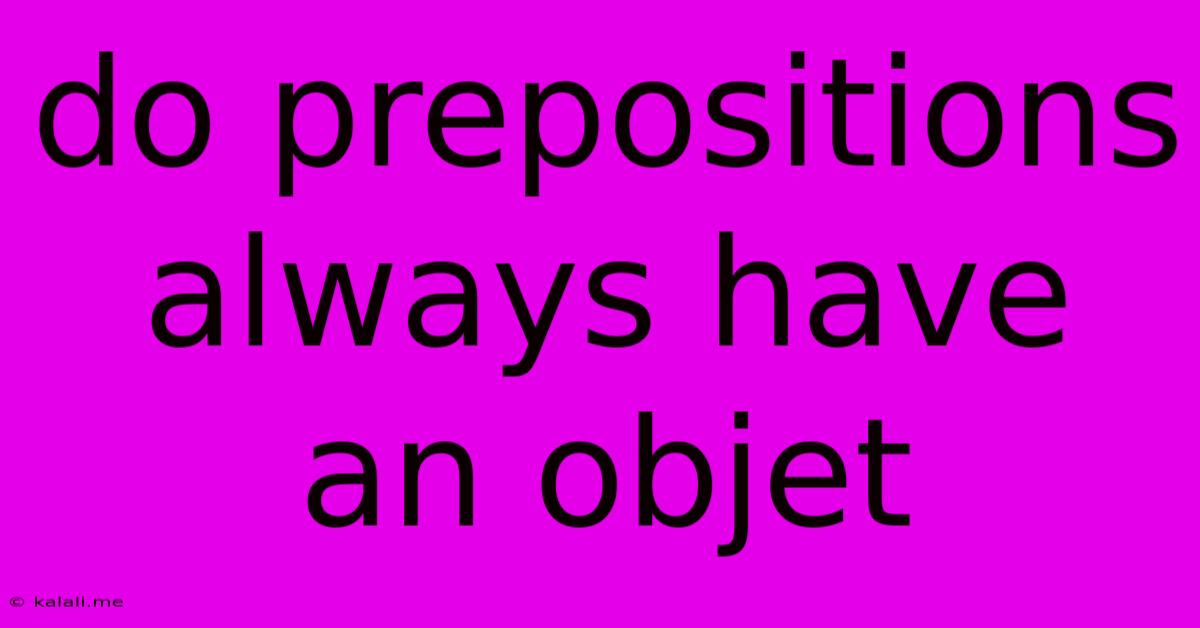Do Prepositions Always Have An Objet
Kalali
Jun 08, 2025 · 3 min read

Table of Contents
Do Prepositions Always Have an Object? A Comprehensive Guide
Meta Description: Discover the nuances of preposition usage in English grammar. This guide clarifies whether prepositions always require objects and explores exceptions and complexities. Learn to confidently use prepositions in your writing.
Prepositions are words that show the relationship between a noun or pronoun (the object of the preposition) and another word in the sentence. They indicate location, time, direction, manner, or other relationships. The common question arises: do prepositions always need an object? The short answer is: generally, yes, but with important exceptions.
This article delves into the intricacies of prepositional phrases, exploring instances where the object might be implied or omitted, as well as situations that might initially appear to contradict this rule. Understanding these nuances is crucial for accurate and effective communication.
Understanding Prepositional Phrases
A prepositional phrase always consists of a preposition followed by its object. This object is usually a noun, pronoun, or noun phrase. For example:
- In the garden (In = preposition; the garden = object)
- On the table (On = preposition; the table = object)
- With great enthusiasm (With = preposition; great enthusiasm = object)
- Because of the rain (Because of = preposition; the rain = object)
When Prepositions Seem to Lack Objects
Certain situations might make it seem like a preposition lacks an object. Let's examine some common scenarios:
-
Ellipsis: Sometimes, the object is omitted because it's understood from the context. Consider the sentence: "He went to the park, and she went there too." In the second clause, "there" acts as the implied object of the preposition "to". The complete phrase is implied but not explicitly stated.
-
Fixed Expressions (Idioms): Many idiomatic expressions use prepositions where the object's meaning is less clear or not directly relatable to the preposition itself. Phrases like "by and large," "at large," or "up to" don't have easily identifiable objects, yet they function grammatically as prepositional phrases. These are exceptions to the rule because their meanings are established conventionally.
-
Prepositions of Place and Time: In some cases, especially with prepositions indicating location or time, the object might be implied or very general. For instance, "He's at home," or "She arrived yesterday." While you could add further detail (e.g., "He's at home in his study"), the object is often implicitly understood.
-
Adverbial Prepositions: Certain prepositions function more like adverbs, modifying the verb rather than creating a clear prepositional phrase with a distinct object. Examples include "He walked down," or "She looked up." While arguments can be made about implied objects, these prepositions are better understood within their adverbial function.
The Importance of Context
The key to understanding whether a preposition requires an object lies in considering the context. If the meaning is incomplete or unclear without an object (explicit or implied), then the preposition likely requires an object for correct grammatical structure and clear meaning.
Conclusion
While the general rule is that prepositions require an object, several linguistic nuances and idiomatic exceptions exist. A deep understanding of ellipsis, fixed expressions, and the contexts where implied objects are sufficient enables accurate and effective prepositional usage. Always prioritize clear communication; if the omission of an object creates ambiguity, it's best to include it for enhanced clarity.
Latest Posts
Latest Posts
-
Is It Legal To Tie Two Breakers Together
Jun 09, 2025
-
Java Lang Null Pointer Exception Minecraft
Jun 09, 2025
-
Best Way To Ping Device Every Few Seconds
Jun 09, 2025
-
Installing A Water Line To Fridge
Jun 09, 2025
-
What Happens If A Body Is Parallel For Too Long
Jun 09, 2025
Related Post
Thank you for visiting our website which covers about Do Prepositions Always Have An Objet . We hope the information provided has been useful to you. Feel free to contact us if you have any questions or need further assistance. See you next time and don't miss to bookmark.